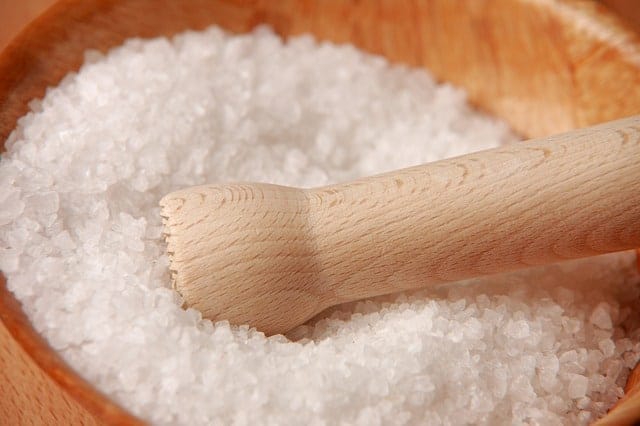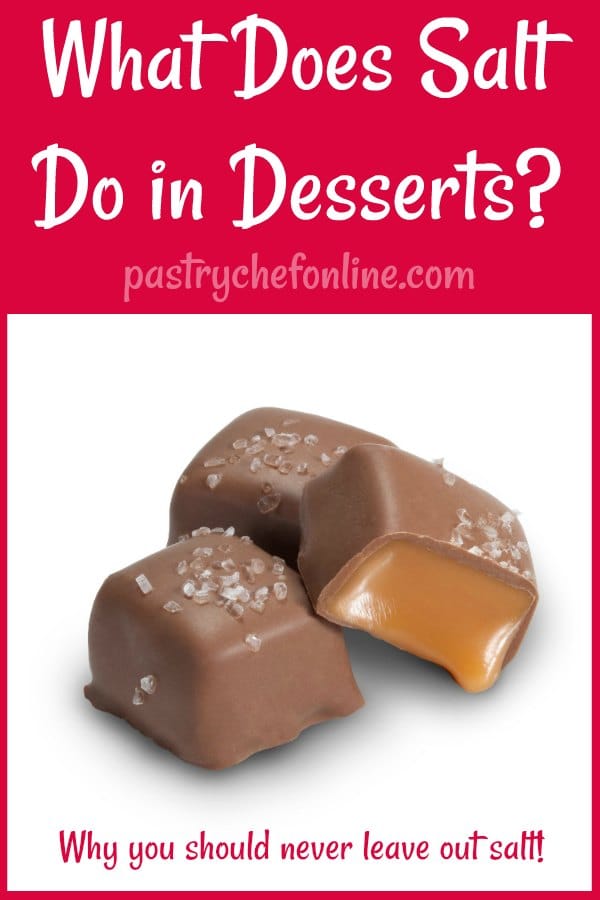This post is part of my ingredient function series and answers the question, among others, “What does salt do in baking?” This post contains affiliate links. For more information, see my Disclosure page.

A few years ago, I went The Beloved and I went to dinner at a chain restaurant that shall not be named, and I ordered creme brulee for dessert while The Beloved ordered chocolate cake. Both desserts tasted very “flat,” without much flavor or dimension. Why? Because they either did not contain any salt (my creme brulee) or did not contain enough salt.
What Does Salt Do In Baking?
Unlike flour, eggs, fat, and sugar, salt doesn’t have much of an impact on the structure of cakes or cookies.
(Note this is not at all the case in baking bread. Salt has quite an effect on gluten and yeast proliferation as well as flavor.)
Bake a cake with eggs and one without, and you will realize that you have made an error. Bake a cake with salt and one without, they will look identical. So what gives? Is salt necessary in your dessert recipes?
In short, the answer is an emphatic yes. Let’s look at what salt does in your baked goods.
Salt is a Flavor Enhancer
Salt makes things taste more like themselves. When used with restraint and precision, salt does not make food taste salty, it just brings out the best characteristics of the food. It turns bland, two dimensional tastes into In Living Color three dimensional tastes.
That’s a lot for a little rock. But remember, salt is one of the five basic tastes we register on our tongues (the rest being sweet, sour, bitter, and umami. Humans register other, more complex flavors with both our noses and our taste buds.)
Salt Makes Food Taste Less Bitter
Salt counteracts bitterness, so any bitter foods (think coffee, unsweetened chocolate, grapefruit) are made more palatable and delicious by adding just a bit of salt. And yes, it sounds weird to put salt in coffee, but if you don’t like coffee because it is bitter, try adding just a tiny bit to your morning cup and see what happens.
Once the bitterness is out of the way, you also end up tasting sweet and sour flavors in a more balanced way. Sweet tastes become less sweet-seeming and more multi-dimensional, and sour tastes are rounded out to be just as tasty but not quite so puckery. (I’ll leave the umami discussion to this article on umami in The Guardian since it doesn’t play much of a part in desserts.)
We Are Primed to Like How Salt Tastes
Our bodies need a certain amount of salt to function properly, so it is built in to our physiology to enjoy the taste of salt. That does not mean we need to be eating tons of the stuff a day, but it does mean using a judicious amount of salt in any cooking or baking will make us more primed to eat and enjoy that food.
How Much Salt Should I Add To My Dessert Recipes?
First, I think there are three different uses for salt in desserts. The first is the most important, I think: salt makes food taste better, so all food needs to be salted at least a little to enhance flavor. Second, salt has gained in popularity as a garnish. For instance, a few grains of flaky salt on top of a piece of chocolate or sprinkled on top of a cookie before baking add a nice pop of saltiness that is a nice contrast, both in flavor and texture, to whatever it is garnishing. Third, some dessert foods are intentionally “over-salted” so the balance of sweet and salty is a bit off and the saltiness figures prominently in the flavor of the dish. Salted caramel sauce, I am looking right at you.
Now, having listed the three different uses of salt in desserts, I am going to go on record as saying the amount of salt you choose to use in any of these three Scenarios is a matter of taste. Especially as a garnish or in something obviously salted like the aforementioned caramel sauce.
What Is Your Rule of Thumb for Adding Salt in Baking?
I’m glad you asked.
To my taste, when adding salt judiciously to enhance the natural flavor of your desserts (again NOT bread)–cakes, puddings, cheesecake, pie filling, hot fudge sauce, and literally every single dessert you can think of–here is my Rule of Thumb:
- Add 1/4 teaspoon salt per cup of flour. (I weigh my flour at just over 4 ounces.)
- Add 1/4 teaspoon salt per cup of sugar. (Granulated sugar weighs about 7 oz/cup.)
- If the dessert you are making contains both flour and sugar, use one or the other measurement, taste, and then add from there if necessary. For example, my basic (and excellently delicous) pound cake recipe calls for 13 oz cake flour, or about 3 cups. It also contains 3 cups of flour, or roughly 21 oz. The first time I made it, I added 3/4 teaspoon salt to the batter, tasted, and decided it needed a bit more. 3/4 teaspoon was a good starting point. I describe the final amount of salt for the cake as 1 very gently rounded teaspoon which probably equals just under 1 1/4 teaspoons of salt. What I’m trying to say is just because there are 3 cups each of flour and sugar didn’t automatically equal the addition of 1 1/2 teaspoons (1/4 teaspoon x 6) of salt.
As an aside, please, for precision’s sake, buy and use a kitchen scale. They are not expensive, they are accurate, they will save you getting all your measuring cups and spoons dirty, and they just make life easier.
Below is a link to the kind of scale I use.
What Kind of Salt Should I Use In My Desserts?
The answer to this one really depends on which of the three Salt In Desserts Scenarios you’re going with. For garnish, you will want to use a “pretty” salt. One with large, flaky crystals or a salt that has an interesting color. For adding saltiness to a caramel sauce, if you’re calling it sea salt caramel sauce, you know what to add. Otherwise, you can use kosher salt or a fine salt to taste. As far as adding salt as a flavor enhancer, I generally stick with a fine sea salt rather than table salt. A fine salt will dissolve well in your batter and it won’t add any slight bitter iodine edge. After all, we’re trying to counteract bitterness, so why add additional bitter flavors along with your table salt?
In the restaurant, I used Diamond brand kosher salt in all our baking.
Kosher salt is lighter than fine salt, so you will need to add a bit more than is called for. However, because nobody wants to mess up their dessert by making it too salty, I vote to stick with fine sea salt for all your baking and pastry needs unless you’re using it as a garnish.
Kenji Lopez-Alt of SeriousEats wrote an excellent article on the difference between using Diamond brand and Morton’s for kosher salt and more on salt. Note you cannot substitute Morton for Diamond (or vice versa) 1:1 because the crystal size is different, so please read his article on the differences between Morton and Diamond kosher salts.
ALSO PLEASE NOTE: Just because you are garnishing your chocolates or cookies or brownies with a few flakes of finishing salt does not mean that you can cut back on the amount of salt in the recipe. Just so we’re clear.
What Are Some of Your Favorite Salts To Use In Baking?
I probably own something ridiculous like 14 kinds of salts. But here are my picks for salt you will turn to again and again, for adding to dessert or for garnishing.
I hope this post has answered some of your questions about using salt in your desserts including the biggie “what does salt actually do in desserts?,” and I really hope that if you haven’t been using any salt up until now, that you will change your tune. Your taste buds will thank you.
Book Recommendations on Salt and Baking/Cooking with Salt
You wouldn’t necessarily think that salt would be a fascinating subject, but wars have been fought over access to salt. The word “salary” has its root in the word salt–it was precious stuff! Here are some great references for you to consider.
If you are interested in the ingredient function of other pastry ingredients, please visit my Ingredient Function page.
Thank you for spending some time with me today. Take care, and have a lovely day.







Yio Zhi says
“for precision’s sake, buy and use a kitchen scale”
-still using volumetric
Jennifer Field says
The vast majority of my measurements are given in ounces by weight. I have also begun adding gram measurements. Thanks for your comment.
Stephie says
Hi
I thought I read somewhere that the rule of thumb for salted or unsalted butter in a baking recipe is, if there’s salt in the recipe then you should use unsalted. And if there is no salt then use salted butter. I was explaining this to my husband and he tell me (he thinks he’s a better baker) it makes a difference if there’s fruit in the recipe. I was making a banana split pie from a recipe a friend gave me. There is no salt in the recipe. I looked online trying to compare this recipe and found a similar one but it calls for unsalted butter but there’s no salt at all in the recipe. OK, no I made it and I used my friend’s recipe and the salted butter. So does baking with fruit have anything to do with it?
Thanks
Jennifer Field says
Hey, Stephie!
I don’t think it is quite as simple as saying don’t salt if using salted butter, because you may think whatever you’re making needs a touch more salt than just the salt in the butter. Or you may think it’s too salty. So generally, I advocate for using unsalted butter and then salting to taste, My general rule of thumb is about 1/4 teaspoon salt for each cup of flour or cup of sugar (depending on what you’re making).
I often find dessert recipes do not call for salt, but salt is a flavor enhancer, meaning it makes everything taste more like itself. So some ingredients might need just a mere hint of salt to taste their best while others may need a bit more to bring out all the flavor.
For example, if I want to play up the sweetness of peaches, I’ll use a good amount of sugar and just a pinch or two of salt. If I want to play up their “meatiness” and use them in a savory dish, I’ll use less sugar (or no sugar) and salt more aggressively. It really depends on how sensitive you are to salt.
If you’re new to using salt in desserts especially, and it’s something you can add salt to along the way (like pie filling or a pudding as opposed to a cake, for example), start with zero salt and then add some–maybe 1/8 teaspoon at a time, until you get the desired result. It could be that you may overshoot your first couple of times until you figure out where the sweet spot (salty spot? lol) is for you. I think it’s a given that salt makes pretty much everything taste better, but it’s a personal preference as to how much you need.
I hope that helps some. Thanks for your question!
Jim says
By the Bones! I whole-stomached’ly approve.
The Khazars would as well: Ateh dipped her food in “seven different kinds of salt” ere eating.
Perhaps a bit of salt in the sugar-glaze?
onlinepastrychef says
Yes, especially in the sugar glaze. You’ll be Pleasantly Surprised. So would Ateh 🙂
onlinepastrychef says
@Chef E Lots of water seems to be the key! Enjoy your next special occasion 🙂
@Daily Spud I fear that I repeat myself, but does a zealot only preach on the street corner once? I think not 😉
Daily Spud says
Salt. Right. Gotcha. Like how I loved that bit of salt in your biscookies. Methinks I’m getting the hang of this 🙂
Chef E says
Yes, water can be a culprit my I also have a heart condition that agitates it and has since I was young, I just deal with it by no salt, and lots of water. I only consume beer or whisky on special occasions, no sodas for me! I would love some of your goodies though!
onlinepastrychef says
@informalblathering It’s true: once you’ve tasted a well-seasoned dessert, it’s very obvious when salt is missing. Everything just starts to taste bland, bland, bland. Blah!
onlinepastrychef says
@Tangled Noodle The only thing that I occasionally don’t put salt in is a really tart key lime or passionfruit curd. Pretty much anything else is fair game. Just add a wee pinch to start–with some things, that’s all you need. Example: strawberries w/some sugar and mint or basil in them=yummy; same thing with the addition of maybe 1/8 tsp. salt=Oh-My-God-This-Is-Good 😀
Tangled Noodle says
Question, Teacher: is there any kind of dessert that you shouldn’t put salt? It seems to run the gamut but I’d hate to be the unfortunate soul who discovers the exception to the rule when I serve dessert to Mr. Noodle’s boss (or other important personages)!
informalblathering says
Ever since making those New York Times cookies (the ones with the coarse salt and the 24 hours of rest and the 2 kinds of flour) I have been hooked on salt in desserts. I actually have to get down to the kitchen to work on some salted cupcakes…
onlinepastrychef says
@croquecamille (and to everyone else) Yes! Let this be a lesson unto us all 😀
@Libby (rubbing jaw) Check in on Monday 🙂
@Zita A woman after my own heart!
@Chris I didn’t feel too obnoxious, because I was being nice 🙂 Really, it was so close–just a little salt would have completed that dessert! And, for anyone who hesitates, see what Chris says: there’s a biological justification!
@Chef E My answer to sodium issues is usually just to drink a lot more water. There is actually a school of thought that HBP might have something to do w/mild dehydration. Run that one past the doctor and see what he has to say 🙂
@Lisa So happy you stopped by; will be seeing you around, I hope 🙂
@Donna What can I say–we are a regular Laurel and Hardy show 😆
@kj If only everyone were so easy, I wouldn’t have to strain my throat, and my fingertips, extolling the virtues of salt! 😆
kj says
Yes maam. Done and done!!
Donna @ Way More Homemade says
You had hubs and I laughing so hard because I am SO that way… got to tell them how to do it. We are so similar. 🙂
Lisa@The Cutting Edge of Ordinary says
Love your blog! What took me so long to find it?? Good thing you stopped by mine so I could discover yours! lol. I’ll be checking in from now on.
Chef E says
I agree, but I have to of course buy nuts with out salt because I have HB and sodium is my enemy, but the last few days nibbling on cashews with a beer and thinking…something is freaking missing here!
Chris @ Beyond Ramen says
Remember that comment about the different types of taste buds? Biological justification for sweet and salty combination? Check! 🙂
I always used to think it was obnoxious to complain about food at a restaurant, especially when my Mom used to do it regularly. But after doing some foodie reading and having to pay for a lot of my own meals, I realized that it is totally acceptable to suggest something to the server after you’ve eaten it; unless it violates some vegetarian restriction, sending the dish back is still taboo for me. But I have on occasion been a food snob and told the server to tell the chef so-and-so-snobby thing.
Thanks for the reminder – I shalln’t forget the salt in tomorrow’s pie crust or filling =]
Zita says
Ha…I put even salt on my coffee 🙂
Libby says
On the salt, as I have stated before probably in your related salt post, Ya just gotta do it. It will even wake up a mundane canned pie filling (shudder the thought of canned, but it can help).
Fair Maiden, check your Twitter soon as I will Smack you with the Glove once more 😉
croquecamille says
Yes! Dessert needs salt! In my first kitchen job, the chef instilled in me the idea that nuts should NEVER UNDER ANY CIRCUMSTANCES be served without salt. And the wonderful things it does to crème anglaise!
When I was in college, I was subject to a psychology study where the student performing the study brought samples of chocolate cake around to the dorms, saying it was for a campus-wide recipe contest. He then left each subject alone with an evaluation form.
The cake was salty, but as I nibbled, I decided I really liked it! The chocolate and salt made a totally new taste experience! Of course, the theory was that the cake was terrible, and people would lie in order not to hurt his feelings. I think I may have learned more that day than the psych student. 🙂